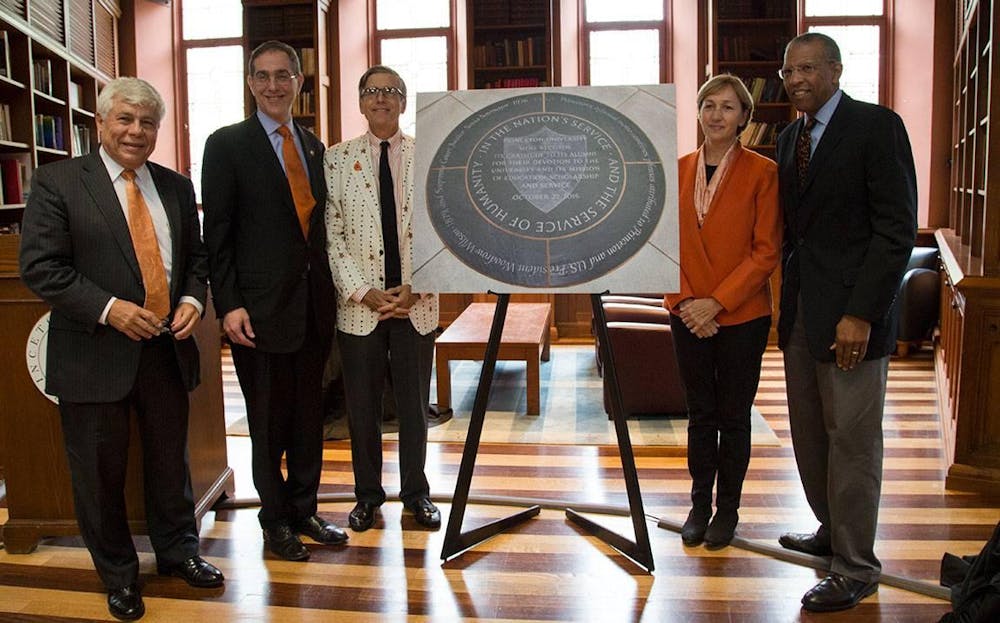Princeton’s informal motto, “In the Nation’s Service and the Service of Humanity,” is inscribed into a medallion in front of Nassau Hall, plastered on posters in late meal, and found in almost every University brochure. Composed of phrases attributed to President Woodrow Wilson Class of 1879 and Supreme Court Justice Sonia Sotomayor ’76, the motto has sparked hotly contested debates in recent years that focus on the student body’s choice of postgraduate career.
On October 25, 1902, Wilson delivered his inaugural address as Princeton’s President, titled “Princeton for the Nation’s Service” at Alexander Hall. To Wilson, serving the nation was an institutional responsibility whereby the University produced thoughtful and informed citizens alongside trained academics. Wilson believed that the “processes of instruction which fit a large body of young men to serve their generation … ought also to serve as the initial processes by which scholars and investigators are made.”
To fulfill this institutional responsibility and produce “efficient and enlightened” citizens, Wilson advocated vigorously for a liberal arts education, believing that colleges should seek to make students “more than excellent servants of a trade or skilled practitioners of a profession.” He asserted that universities should equip students with “elasticity of faculty and breadth of vision” such that merchants have “traveled minds,” engineers “a knowledge of books and men,” and physicians “a familiar acquaintance with the abstract data of science.”
In October 2016, three days shy of the 114th anniversary of Wilson’s inaugural address, the University revised its informal motto to include that of Sotomayor. According to University President Christopher Eisgruber ’83, while Princeton “became a research university” under Wilson, the University “opened gates to a wider world, becoming at once more diverse, more international and more intellectually eminent than ever before” during Sotomayor’s time.
In recent months, both portions of the motto have been the subject of vigorous debate.
In an opinion piece in The Daily Princetonian, Jia Cheng Shen ’28 argued that a Princeton education is a public good on account of the innumerable public resources that enable it, a position reminiscent of Wilson’s stance that the “service of institutions of learning is not private, but public.” In acknowledging the importance of these resources, including “institutional and public investments,” federal funding, and alumni donations, Shen argued that Princetonians should prioritize careers that adhere to the University’s informal motto. In the Class of 2025 Senior Survey, 65 percent of the graduating seniors characterized their postgraduate plans as such, a percentage that often decreases as expected incomes rise.
Joel Ibabao Jr. ’27 offered an alternative perspective, one in which high-paying careers do not necessarily require a rejection of “learning, public service, or self-discovery” and highlighted Mellody Hobson ’91 as an example. Hobson, who grew up low-income, achieved financial success by climbing the corporate ladder at Ariel Investments. Now, she has donated the lead gift funding the construction of Hobson College, among other philanthropic pursuits.
Supplementing Wilson’s view, service has been embedded in Princeton’s curriculum as an individual-level pursuit. The University offers numerous service-oriented and paid summer internships through Princeton Internships in Civic Service and empowers students to undertake in-field experiential learning through the Program for Community-Engaged Scholarship.

“Through service, students can explore their values and interests, expand critical thinking, and develop the skills and perspectives necessary to successfully contribute to challenging and dynamic environments,” Pace Center Executive Director Kimberly de los Santos wrote in an email.
Wilson’s and Sotomayor’s words continue to reach students, under their feet as they walk over the medallion during Opening Exercises and in their ears as they listen to President Eisgruber describe campus as a place that “cherishes the importance of service.”
Vincent Sanfedele is a staff Archivist for the ‘Prince.’ Please send any corrections requests to corrections[at]dailyprincetonian.com.









